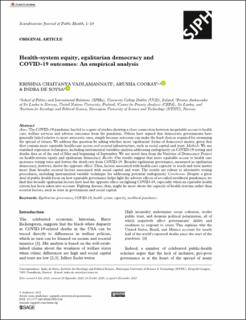| dc.contributor.author | de Soysa, Indra | |
| dc.contributor.author | Vadlamannati, Krishna Chaitanya | |
| dc.contributor.author | Cooray, Arusha | |
| dc.date.accessioned | 2021-01-19T13:59:59Z | |
| dc.date.available | 2021-01-19T13:59:59Z | |
| dc.date.created | 2021-01-18T15:51:03Z | |
| dc.date.issued | 2020 | |
| dc.identifier.citation | Scandinavian Journal of Public Health. 2021, . | en_US |
| dc.identifier.issn | 1403-4948 | |
| dc.identifier.uri | https://hdl.handle.net/11250/2723727 | |
| dc.description.abstract | Aims:
The COVID-19 pandemic has led to a spate of studies showing a close connection between inequitable access to health care, welfare services and adverse outcomes from the pandemic. Others have argued that democratic governments have generally failed relative to more autocratic ones, simply because autocrats can make the hard choices required for stemming the spread of viruses. We address this question by asking whether more ‘egalitarian’ forms of democracy matter, given that they contain more equitable health-care access and societal infrastructure, such as social capital and trust.
Methods:
We use standard regression techniques, including instrumental variables analysis addressing endogeneity on COVID-19 testing and deaths data as of the end of May and beginning of September. We use novel data from the Varieties of Democracy Project on health-system equity and egalitarian democracy.
Results:
Our results suggest that more equitable access to health care increases testing rates and lowers the death rate from COVID-19. Broader egalitarian governance, measured as egalitarian democracy, however, shows the opposite effect. Thus, factors associated with health-care capacity to reach and treat matter more than broader societal factors associated with social capital and trust. The results are robust to alternative testing procedures, including instrumental variable technique for addressing potential endogeneity.
Conclusions:
Despite a great deal of public health focus on how equitable governance helps fight the adverse effects of so-called neoliberal pandemics, we find that broadly egalitarian factors have had the opposite effect on fighting COVID-19, especially when an equitable health system has been taken into account. Fighting disease, thus, might be more about the capacity of health systems rather than societal factors, such as trust in government and social capital. | en_US |
| dc.language.iso | eng | en_US |
| dc.publisher | SAGE Publishing | en_US |
| dc.rights | Navngivelse 4.0 Internasjonal | * |
| dc.rights.uri | http://creativecommons.org/licenses/by/4.0/deed.no | * |
| dc.title | Health-system equity, egalitarian democracy and COVID-19 outcomes: An empirical analysis | en_US |
| dc.type | Peer reviewed | en_US |
| dc.type | Journal article | en_US |
| dc.description.version | publishedVersion | en_US |
| dc.source.journal | Scandinavian Journal of Public Health | en_US |
| dc.identifier.doi | 10.1177/1403494820982106 | |
| dc.identifier.cristin | 1873476 | |
| dc.description.localcode | http://creativecommons.org/licenses/by/4.0/This article is distributed under the terms of the Creative Commons Attribution 4.0 License (http://creativecommons.org/licenses/by/4.0/) which permits any use, reproduction and distribution of the work without further permission provided the original work is attributed as specified on the SAGE and Open Access page (https://us.sagepub.com/en-us/nam/open-access-at-sage). | en_US |
| cristin.ispublished | true | |
| cristin.fulltext | original | |
| cristin.qualitycode | 1 | |

